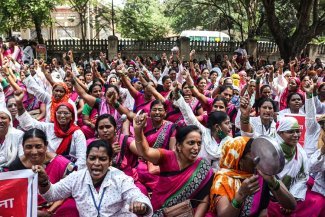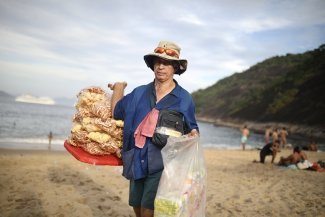After Ilhan Bilir disappeared in 1992 his brother Ramazan started to look for him. Güllü Bilir, Ramazan’s wife, told researchers at the Istanbul-based Truth Justice Memory Centre what happened next.
“He would walk on foot, searching for him…He would go everywhere his brother could have stopped by. ‘I won’t stop…I must find out what happened to my brother,’ he used to say.”
After three years, somebody came to Ramazan promising to reveal his brother’s whereabouts. Ramazan went with this person and was never seen again.
The brothers are both presumed to have been abducted and killed by Turkish security forces.
Their story is just one account of many featured in the report The Unspoken Truth: Enforced Disappearances produced by the Truth Justice Memory Centre, and is a story familiar to families across Turkey.
Between the years 1980 and 2000, an estimated 1500 to 2000 people were forcibly disappeared.
With important exceptions, most victims were male and Kurdish. Incidents peaked in the 1990s in the context of the conflict between the Turkish government and the Kurdistan Workers’ Party (PKK), a one-time Kurdish separatist, insurgent group, which has since renounced its aim of establishing an independent Kurdish state.
The unresolved history of Turkey’s enforced disappearances goes to the heart of what’s at stake as the Turkish government and the PKK negotiate an end to the conflict, which has lasted over three decades and killed more than 40,000 people.
Will the negotiations seek a peace built on a reckoning with the past and promote comprehensive social change, or will they simply seek to stop the armed conflict?
And if there is to be a reckoning, how far must it go? How far can it go?
“One of the main problems in Turkey is impunity of state actors. We have the law, we have the criminal code, but there is impunity. You can’t have a sustainable peace with that impunity, so that has to change. In order to show that it will change, you have to deal with the crimes of the past,” Murat Çelikkan, co-director of the Truth Justice Memory Center, told Equal Times.
Enforced disappearances were one part of Turkey’s comprehensive policy to eliminate local support for PKK guerrillas in the 1990s.
State-of-emergency rule was established in many provinces. The Turkish army reorganised itself to fight “low intensity warfare”.
Villages were burnt and evacuated. Suspected PKK partisans were shot in the street.
Thousands of citizens in Turkey’s predominantly Kurdish regions were deputised into state-armed militias—a scheme that served to sort the Kurds loyal to the state from those with PKK sympathies.
The victims of enforced disappearances were typically taken in full view of witnesses by people claiming state authority and offering reassurances the person would be returned after answering some questions.
Afterwards, state officials would consistently deny all knowledge of the missing person’s whereabouts or fate, while at the same time, often tacitly acknowledging the disappearances to intimidate anyone looking for the missing.
All this was effectively sanctioned by the government’s anti-PKK policy, according to Truth Justice Memory Center research.
Loved-ones and anyone else searching for the missing were considered little better than criminals. The press, academy and civil society were silenced. The state’s prerogative was paramount.
“We have been working on this issue for the last three years full-time, and we could only confirm 450 people [were forcibly disappeared]. But I believe somewhere in the state they have all those documents,” said Çelikkan.
“Most of the people, the relatives of the disappeared, don’t have graves [at which] to mourn. The state knows where those people are buried.”
A ‘terrorist’ or human rights issue?
For decades, Turkey’s army-backed state elite governed the country according to variations of a “Kemalist” ideology (after Turkey’s founder Mustafa Kemal Atatürk) which sanctified a Turkish, nationalist, assimilationist, unitary, laic state.
The Kurdish issue was seen entirely in terms of national security; army dogma saw no “Kurdish problem”, only a “terrorism problem”.
But since the ruling Justice and Development Party (AKP) came to power in 2002 it has supplanted the Turkish army’s hold on politics and replaced the old guard’s ideology with its own.
“The Kemalist state…broke down when the Islamist government took over. That ideology…cracked,” Çelikkan said.
“You need cracks for the light to go through,” said Çelikkan of the developments that have made the current peace process possible.
However, concerns remain that the AKP government has not entirely renounced the “security” view of the Kurdish issue and, in negotiating with the PKK, may be seeking limited goals.
“At the moment I don’t see on the government side any interest in a human rights approach to the peace process,” Emma Sinclair-Webb, a senior researcher at Human Rights Watch and author of Time for Justice: Ending Impunity for Killings and Disappearances in 1990s Turkey, told Equal Times.
“The ‘Kurdish issue’ is not a human rights issue for them. They see it as about finishing terrorism…[and] getting rid of the problem of the PKK,” she said.
The AKP’s defeat of the army was largely achieved by two mass trials, commonly referred to as the ‘Ergenekon’ and ‘Sledgehammer’ trials, launched between 2007 and 2010.
In both trials, prosecutors essentially claimed the accused—hundreds of serving and retired army officers, as well as Kemalist, neo-nationalist journalists, lawyers, and activists, plus a few gangsters—were coup plotters.
The trials created space for other prosecutions, notably the prosecution of Cemal Temizöz, a gendarme commander allegedly responsible for at least twenty enforced disappearances in and around the city of Cizre.
But the Ergenekon and Sledgehammer trials were clearly political with little legal basis, and as the government’s alliances shifted so too did its political interests in the trials.
As of 2015, both trials have been effectively abandoned.
“I have a real worry [regarding] the decision to completely acquit the Sledgehammer defendants…[and] to close the Ergenekon dossier, however much those were abusive of fair trial rights, and I think they were,” said Sinclair-Webb.
But in closing those chapters after having got civilian control of the military, Sinclair-Webb wonders whether the government was making an unofficial, perhaps unspoken pact with the military. “How much political willingness is there now today to take those investigations seriously?”
A long reckoning
The government’s position reflects its general ambiguity towards alleged historical crimes – crimes which are not limited to enforced disappearances in the 1990s.
Some civil society actors argue that Turkey’s reckoning must go back as far as the foundation of the Republic and the Armenian genocide which preceded it, through to the country’s history of coups d’état, and forward to the country’s most recent mass tragedies.
“Almost everything in Turkey is based on denial. That’s the policy,” said Çelikkan.
Turkey’s Saturday Mothers/Saturday People group gathers every week in Istanbul and elsewhere around the country to commemorate and seek justice for Turkey’s forcibly disappeared.
On 25 April 2015, one day after the centenary of the Armenian genocide, the group devoted their weekly gathering to the Armenians who perished in 1915.
Maside Ocak, whose brother Hasan was disappeared and killed in 1995, held a portrait of Armenian-Ottoman journalist Keğam Parseğyan (1883-1915).
Mikal Kırbayır held a portrait of his brother Cemil—killed while in custody following Turkey’s 1980 coup—as well as a portrait of Armenian Dr. Parunag Ferukhan.
Hrag Vartanian, an Armenian-American art critic in Istanbul for the genocide commemorations, told Equal Times as he sat with the Saturday Mothers: “When you look at the arc of history, it’s becoming so clear that it’s not just about a couple of groups. It’s a slow carving away at any type of difference.”
“The whole ideology and culture started with the Armenian genocide,” Çelikkan said. “Pogroms against the Jews, Greeks, the Alevis, the coup d’états. One after another this society has not dealt with them.”
“Dealing” with the past will require comprehensive structural reforms.
In a recent report on the government-PKK negotiations published by Turkey’s Peace Parliament, a civil society group of academics and activists, Çelikkan argues a new constitution is necessary, one free of references to ethnicity – that is, “Turkishness” – in the definition of citizenship; the Turkish criminal code and laws governing elections, education, and political parties must be amended; and amnesty should not be granted to human rights violators.
Truth commissions, museums, memorials, archives and other sites of memory and “truth-telling” and all other mechanisms of transitional justice must be incorporated into the reckoning.
But reckoning is not only a matter for transitional justice.
On 13 May 2014, 301 coal miners died in Soma, western Turkey, in one of the worst industrial accidents in the country’s history.
Despite the legal case against company officials, the government has invoked its legal right to protect civil servants and public officials from prosecution.
“If you just use the word ‘impunity’ it’s a word that means nothing to most people,” said Sinclair-Webb.
“You need to tell the stories of miners who tell you ‘we were treated like animals, and state inspectors let it happen and were complicit in it’. You need to hear that story to understand what impunity means. Or you have to hear villagers in the Kurdish region who say ‘I’ve been waiting twenty years to understand where my husband’s bones are, where they buried him. I want to know. I want answers.’ And you have people asking such questions all the time in Turkey.”
A peace process that facilitates a reckoning with Turkey’s history of enforced disappearances could be the basis for a much wider reckoning. Whether this can be achieved remains to be seen.








